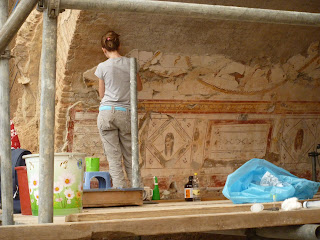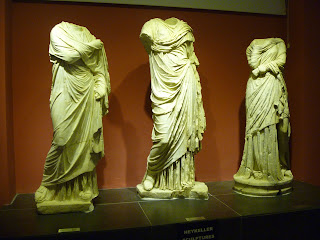How could I have skipped Plymouth? Whatever else I think about England – and thinking about England exercises my mind a lot while I’m here – she is the history queen. She never lets you forget that.
So many famous and infamous boat people left England, or were sent from England, from Plymouth’s docks – explorers, convicts, settlers, merchants, adventurers. Huge stone steps dropping down from the cobbled quay to the kelpy waterline trip a switch in my memory. I’ve read enough books, seen my share of BBC dramas. I know this place. I can fill in the missing details – the tall ships, the chaos, the excitement and the excrement. The characters are still here though. I don’t need to invent them.
Something was happening on the Plymouth waterfront last Saturday night. Perhaps it was just summer. A bit of warmth turns people’s heads here. Still I thought the people looked a bit exaggerated, a bit distorted, like characters out of Little Britain. The Old Guys Rule gang were in town in their leathers, and far too many girls were out walking, arm in arm, in very high heels. They were wearing sashes across their lurid short dresses. Later on, the night noises outside our hotel turned feral. I thought of Harry Brown – I mean Michael Caine’s character in the movie called Harry Brown – and then some more about England, and what she is, and has been. Perhaps there isn’t much difference between the two. Plymouth, I reckon, was probably never a very safe place after dark.
With a day up our sleeves, we took the long road to from Plymouth to Bristol, our leaping off place for flying in and out of Belfast in a day. Antony House is close to Plymouth as the crow flies, but across the Tamar River. That distance from Plymouth would suit me. In fact, Antony House would suit me. You can see why in the pictures below.
I’d have to have been better born to get a look in though. The same family, called Crew Pole, has lived in the place continuously for 600 years. That’s clever. Perhaps their daughters didn’t catch the king’s eye. Perhaps their sons kept clear of politics. Whatever, they hung onto a very beautiful piece of land, planted a garden of wonders and, in the 18th century, built a new house which against the odds, still feels alive and lived in, because it is.
We’ve become far too familiar with the orange livery of the budget airline Easy Jet. No point complaining about the horrible schedules and no frills processing. That’s the deal. Low cost air travel along with wireless internet underpins this exhaustive (and exhausting) boat search.
The boat we went to see in Northern Ireland held out so much promise. She was a late contender, but a strong one, we thought, with a hard-top and the layout I prefer i.e. a centerline bed and chairs in the saloon. She wasn’t easy to view, hanging as she was on a mooring on Strangford Loch. The broker begged to differ. Almost all her boats, she told us, were on moorings, and this one was relatively straightforward to access compared to most. Marinas, you understand, are not the norm in Ireland. Strangford Loch reminded me of New Zealand, where marinas are not the norm either.
Here’s where we picked up a tender to drive out to the boat. As usual, we spent a few hours aboard her. She was the last boat on our list.
That brings us back to The Stag, in Lyndhurst, where we’ve parked ourselves for the past two nights to chew over our options. Yesterday, as well as watching Andy Murray beat a lack lustre Spaniard on centre court, we went to Bucklers Hard to top up the history levels – on the recommendation of my mother. Thanks mum. I have a soft spot for that grand old man of the sea, Francis Chichester, and Bucklers Hard, though I hadn’t recalled it, is where he kept his Gipsy Moth yachts for 30 years. There’s an elegantly carved memorial to Chichester in the tiny chapel in the village. The maritime history museum there has his cap and camera. Yes, I’m a Chichester groupie.
The main draw at Bucklers Hard is its 18th century ship-building history. Many of Nelson’s war ships were built right in the village, on the Beaulieu River, by a shipwright called Henry Adams, and his lads. We had a good time there, and given that my temper is now horribly frayed, that was important. My stamina levels are well below what is needed for this kind of mission. I don’t like shopping of any kind, even boat shopping. If it were up to me, I’d have bought the first boat we both liked, and damn the expense. Alex, on the other hand, is a trader through and through. He likes to weigh his choices. He likes to have choices. He might buy the first boat he saw, but not before he’s seen everything there is to see. He loves to check out the merchandise. I get bored very quickly by merchandise. When I get raw, he applies balm – wine and food are good, but history, applied in the correct manner, both soothes and stimulates a Termagant Wife (cf a certain Duchess of Malborough, whose portrait is labelled as such at Antony House).




















































